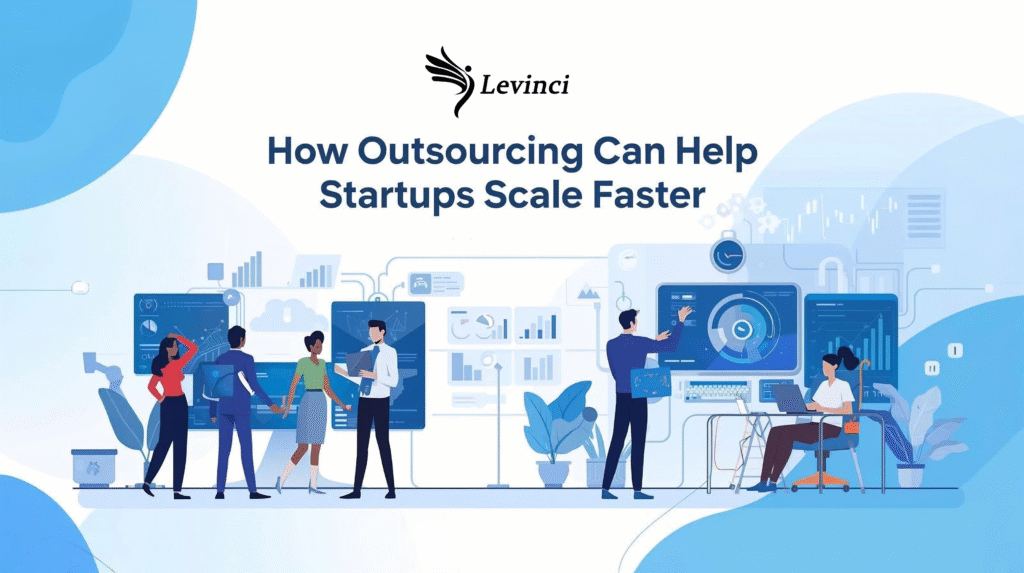In today’s hyper-competitive tech landscape, speed isn’t just an advantage, it’s a survival strategy. Startups, by nature, are built to move fast, innovate boldly, and disrupt established markets. But with limited resources, lean teams, and tight deadlines, scaling quickly can feel like an uphill battle. This is where outsourcing becomes more than a cost-saving tactic, it becomes a strategic growth accelerator. In this article, Levinci will explore how smart outsourcing decisions can help startups not only scale faster but scale smarter.

Why do startups need to scale quickly?
In the dynamic world of tech and software, scaling quickly isn’t optional, it’s essential. For startups, especially those operating in fast-paced industries, the ability to grow rapidly can mean the difference between leading the market or fading into obscurity. There are several critical reasons why startups must prioritize speed when scaling:
Competitive market landscape
Startups today are born into saturated, hyper-competitive markets, where new players are emerging constantly. In such environments, being “first to scale” often creates a lasting advantage. If a competitor captures market share, builds user loyalty, or establishes brand awareness faster than you, catching up becomes exponentially more difficult and more expensive. Speed helps startups establish their presence before others can replicate or outpace them.
Speed-to-market advantage
The ability to move from concept to product launch quickly allows startups to validate ideas, capture early adopters, and adapt to market feedback before competitors can react. A fast go-to-market strategy reduces the risk of obsolescence and opens up opportunities to iterate in real time based on user datam, something that larger, slower organizations struggle to do.
The limitation of resource and budget
Startups operate with limited runway both in terms of capital and manpower. Unlike large enterprises, they can’t afford to spend months building internal teams or developing every component in-house. Scaling quickly often means prioritizing what to build internally vs. what to outsource, leveraging partnerships, and focusing only on activities that directly drive growth. Time spent hesitating or over-engineering can burn through precious resources without delivering results.

What types of services can be outsourced?
One of the smartest decisions a startup can make is to focus internal resources on core value creation. This approach not only conserves time and capital but also gives startups access to domain experts without the overhead of hiring full-time staff. Below are the most commonly outsourced services that can significantly accelerate a startup’s ability to scale:
Software Development
For most tech startups, building the product is the heartbeat of the business. However, in many cases, outsourcing software development makes strategic sense. Startups can quickly access specialized skills in mobile app development, web platforms, AI/ML, or DevOps without spending months recruiting. Additionally, offshore and nearshore development teams can dramatically reduce time-to-market, allowing startups to move from MVP to launch in record time.
Digital marketing & SEO
In today’s digital-first environment, visibility is currency and that’s where digital marketing comes in. Startups often outsource functions like SEO, performance marketing, social media management, and content strategy to specialized agencies or freelancers.
This allows them to quickly generate leads, increase brand awareness, and build traction while focusing internal efforts on product development and customer experience.
Customer Support
As a startup begins to grow its user base, maintaining a high level of customer support becomes crucial. Outsourcing this function to experienced support teams enables 24/7 availability, multi-language support, and scalable service levels without hiring a large in-house team.
Modern outsourcing partners often offer omnichannel support (email, live chat, social media, etc.), along with analytics and feedback loops that help improve the product.

Accounting & Bookkeeping
While not glamorous, financial management is non-negotiable. Startups often lack the expertise or desire to handle day-to-day accounting, tax compliance, and financial reporting in-house. Outsourcing to a reliable accounting firm ensures accuracy, transparency, and peace of mind especially when preparing for funding rounds, audits, or due diligence.
HR & Recruitment
Hiring the right talent is one of the most time-consuming and high-stakes challenges for any startup. By outsourcing HR and recruitment, startups can accelerate hiring cycles, access a broader talent pool, and ensure compliance with labor laws especially when scaling internationally.
Some firms also offer onboarding, payroll, and benefits administration, allowing startups to operate more like a scaled company without building those internal functions yet.
How to choose the right outsourcing partner?
Choosing the right outsourcing partner is not just a procurement decision, it’s a strategic investment in your startup’s growth, speed, and long-term success. A great outsourcing partner acts as an extension of your team, bringing not only technical capabilities but also alignment with your vision, work style, and pace. Here’s how to make that decision with confidence:
Define Goals and KPIs Clearly
Before evaluating any potential partner, your team needs internal clarity. What do you want? Is your goal to accelerate product development, reduce time-to-market, lower operational costs, or fill a skill gap?
Clearly outlining your objectives, success metrics (KPIs), timelines, and budget upfront helps filter out misaligned vendors early. It also sets the foundation for performance tracking once the partnership begins.
Look for experience with startups
Startups are fundamentally different from enterprises. They move faster, iterate more often, and typically lack rigid processes. When evaluating vendors, prioritize partners with hands-on experience working with startups who understand the urgency, flexibility, and problem-solving mindset that startup environments demand.
Partners who have worked with early-stage companies are more likely to adapt to your pace, suggest lean solutions, and work with limited documentation or changing scopes.

Check References and Portfolio
Anyone can claim expertise but results speak louder. YOu should ask for case studies, client references, or sample projects that are similar in scope, industry, or technology stack to yours. Look at the partner’s portfolio to evaluate their depth of experience and the quality of their deliverables.
Levinci is proud to be a pioneer, providing comprehensive and specialized outsourcing solutions, built on a deep understanding of the challenges and opportunities that businesses, especially startups, are facing.
With many years of experience in outsourcing, Levinci has accumulated a wealth of valuable experience, cooperating with a variety of businesses from potential startups to large corporations. Our team of experts includes talented software engineers, experts in digital marketing, customer support, accounting, human resources and many other fields, ensuring top quality service.
Conclusion
Outsourcing isn’t just a cost-cutting tactic, it’s a strategic enabler that allows founders to move faster, stay lean, and concentrate on what truly matters: building a great product and delivering value to users. By leveraging the right outsourcing partners, startups can overcome resource constraints, tap into global talent, and scale with agility.
Read more:
Levinci – Professional Software Development Services
What is a Web Application? – Advantages and Disadvantages of Web Application
Steps to Prepare Your Organization for an ERP Implementation

